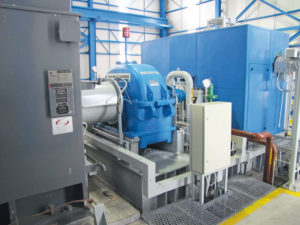In this research area of the Cenicaña Factory Process Program, unit operations are treated where its fundamental principle of operation is the action of a force and the transformation of energy. Examples are the generation, conversion and use of thermal and mechanical energies, heat and its transfer, forces, pressures, dynamics or movement of bodies. Work is being done on the conservation of mass and energy to analyze static and dynamic systems, contributing to the improvement of equipment and its processes. Examples of the above are the processes that are carried out at the reception, preparation, grinding, generation and use of steam and electric power stations, mainly.
This area of physical-mechanical processes is divided into three sub-areas:
Extraction processes
Research is carried out on the operations for receiving adequacy and grinding of cane, evaluating the processes and equipment involved in these operations in search of improvement in operational, energy and economic performance. It works on the generation of strategies that mitigate the effects of the process batch of harvest and transport on the processes of continuous type used inside the factory.
Techniques for measuring the level of preparation of the cane by the chopper and shredder machines are applied. There is instrumentation for physical variables to analyze the static and dynamic structural performance of this type of rotational-dynamic machines. It supports the transversal project CATE (Cut, Moose, Transport and Delivery of the cane), with the objective of proposing technological and operational alternatives that improve the performance of these processes.
In the process of extraction by milling projects are developed aimed at improving the extraction of juice from the cane. The program has a mobile equipment for preparing samples of cane and bagasse, called "Mobile Laboratory", which allows to determine the tandem extraction curve and the performance of each of the milling units. There are computational applications (CENIMOL®) for the determination of the appropriate settings of each mill and prediction of the loads consumed. Energy consumption data can be corroborated in the field through the registration of variables such as torque and RPM. We work on operations control strategies in order to reduce the variability in performance indicators such as: extraction efficiency and bagasse moisture.
Generation and use of energy

The research in the processes of generation and use of energy frame everything related to thermochemical processes such as combustion, pyrolysis and gasification and the efficient use of thermal and electrical energy.
The main objective of this area is focused on generating alternatives that improve the key performance indicators such as fuel consumption, pounds of steam per ton of cane, electricity generated, among others. For this, experimental and virtual methodologies and tools have been implemented and developed as the main resources for research.
Among them, the methodology for the evaluation of the thermal efficiency of boilers in the Colombian sub-energy sector, the study of the behavior of combustion gases and air in boilers through computational fluid dynamics (ANSYS CFD), virtual modeling tools of operational scenarios that generate energy saving alternatives (CENIPROF®) and information management (REE ®) for the improvement of equipment and processes. The use and management of water in the process is one of the key points in this research area, working together with the mills, the water balances of the process are carried out, identifying the points of improvement in resource consumption and energy expenditure . In particular, the possibilities of improvement in condensation systems, including water distribution and treatment, are observed. In addition, the alternatives for energy use of residual biomass from harvest work are analyzed.
Management and performance of equipment or physical assets
One of the most important aspects in the research work of the Factory Process Program, is the management and performance of the equipment or physical assets of the process. This division deals with issues related to the analysis of the causes of failures and detriments of the performance of the different equipment of the sucro-energy process, through the analysis (measurement techniques for strain gauges or strain gage) and stress state modeling (ANSYS Mechanical®) in order to propose alternatives for equipment design improvement. In turn, the designs for prototypes and pilot equipment required in the Factory Process Program research are developed, as an example, pilot equipment has been designed for evaporation, crystallization, fermentation, side discharge wagons, biomass pyrolysis processes. In conjunction with educational entities in the region, research projects have been developed on the specific issue of wear and tear of the components of the preparation and grinding machines in order to find technological alternatives for improving the reduction of the effects of the same. Additionally, research activities are carried out regarding the generation of tools to improve the management and reliability of the equipment and its impact on the processes.












